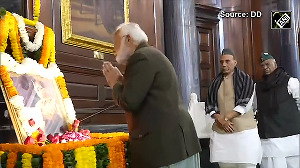Institute of Economic Growth warned on Wednesday that the rise in oil prices due to fears of war in Iraq might "hamper" the government's plan for acquiring and maintaining strategic oil reserves for 45 days and the import bill was bound to go up by 20 per cent this year.
The economic thin-tank also said the exports growth rate would decline due to rising domestic prices, brought about by increased inflation.
"The rise in (international) oil prices will lead to rise in the domestic fuel prices and also this will hamper the government's plan for acquiring and maintaining strategic oil reserves for 45 days," IEG said in its latest report.
However, the signs of "weakening" strike in Venezuela, an important oil producer, and "ebbing" winter demand for oil would put downward pressure on world prices, the Delhi-based institution said.
If there were a prolonged war in Iraq, the inflation based on both Wholesale Price Index and Consumer Price Index for Industrial Workers might go up, IEG warned.
The decline in farm production and expected rise in domestic oil prices would push the inflation rates upward in the coming months from the supply side, even as predicted decline in money supply would to some extent, dampen the high growth in inflation, it said.
On the industrial performance, though the upturn was expected to continue for the rest of the financial year 2002-03, the decline in agricultural growth would be a dampener since the agriculture had strong linkage with the industrial sector.
It said though exports registered a buoyant 34 per cent growth till December, "such a level of growth might not be sustainable."
"It is expected that growth rate of exports will decline to settle around 18.5 per cent on account of increase in domestic prices," IEG said.
Referring to imports, it said the increase in world oil prices would put upward pressure on the import bill, which was expected to go up by 20 per cent in 2002-03.
IEG said the exchange rate might not appreciate further due to expected increase in trade deficit (due to rise in world oil prices) and decline in foreign institutional investments.
It said the foreign exchange reserves, which reached $73.6 billion by January 2003, might not rise further due to the government's decision to pay back $2.8 billion high cost debts in this financial year.
"Moreover, increasing world oil prices, declining real interest rates and lackluster financial markets might also put downward pressure on foreign currency reserves," it said, adding that the repayment of Resurgent India Bond, due in middle of 2003, would also restrain further growth.
On the interest rates, it said the excess liquidity in the economy and the external factors might contain any hike in the interest rates in the coming months.






 © 2025
© 2025